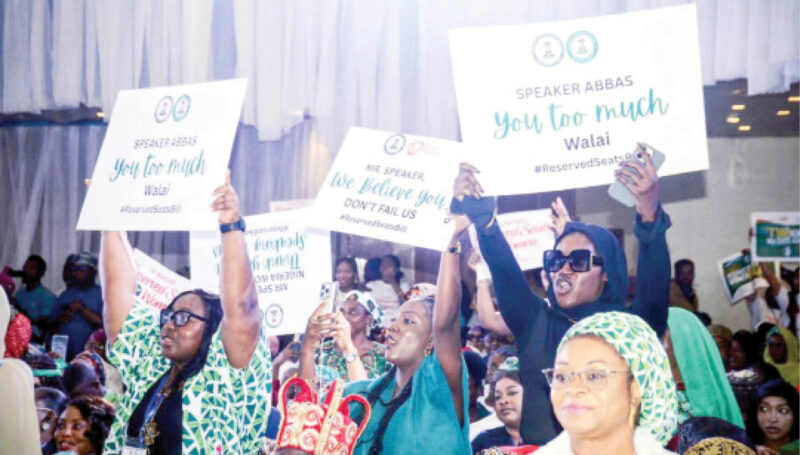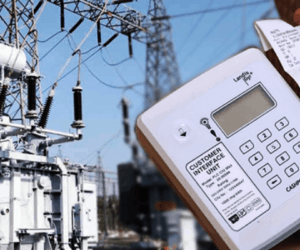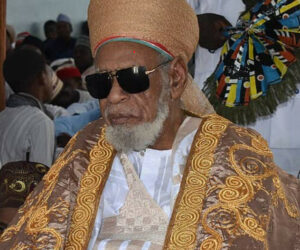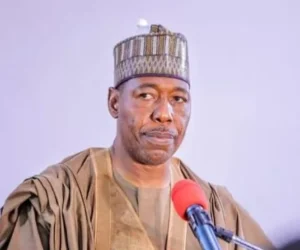The push for special seats for women in the national and state assemblies gained momentum yesterday at a national public hearing on the review of the 1999 Constitution, organised by the House of Representatives Committee on Constitution Review.
The Speaker of the House of Representatives, Abbas Tajudeen, women groups, the United Nations, the United Kingdom, the European Union and other stakeholders expressed support for a bill seeking the creation of reserved seats for women in Nigeria’s legislative houses, stressing that gender inclusion is central to the country’s democratic and developmental aspirations.
This is as women groups also took to the streets of Abuja in protest, demanding support for the bill seeking exclusive seats to be reserved for women in both the federal and state parliament.
SPONSOR AD
The Constitution Review committee chaired by the Deputy Speaker, Benjamin Okezie Kalu, brought together civil society organisations, traditional rulers, members of the diplomatic corps, political parties, women groups/activists, people with disabilities, youth groups and development partners, among others.
In his address, the Speaker said the current representation of women in Nigeria’s parliament is unacceptable, hence the need to support the bill which seeks to increase women representation in parliament.
Women seats bill gains ground
“Today, women hold less than five percent of seats in the National Assembly. That statistic is unacceptable for a country of our size and ambition. The reserved seats for women proposal will create additional seats in the National Assembly and State Assemblies to ensure that every state and senatorial district has women’s voices in lawmaking. This is not tokenism but a constitutional mechanism to accelerate gender inclusion until structural barriers are dismantled”, he said.
The Speaker also explained that inclusivity extends beyond women, with provisions also designed to secure representation for persons with disabilities.
“Similar provisions ensure representation for persons with disabilities at the federal, state, and local levels, recognising their right to fully participate in shaping the laws that affect their lives. Another amendment requires a minimum threshold of women in ministerial appointments to ensure gender balance. These measures will make our democracy more representative, our policies more responsive, and our country more just.”
British High Commissioner to Nigeria, Richard Montgomery, represented by Deputy High Commissioner Jill Lever, praised the House of Representatives leadership for opening the review process to diverse voices. She specifically singled out the reserved seats for women legislative proposals, describing it as transformative.
“I am, of course, talking about the Special or Reserve Seats Bill, which seeks to enhance women’s representation in parliament, addressing a real concern felt by many across the nation about equity. Around the world, we have seen how increased participation of women in governance leads to more equitable decision-making, stronger democratic outcomes, more peace, less conflict, and increased economic growth and prosperity,” she said.
She added that the UK was encouraged by “the very widespread support for this bill” across the country and assured that Britain would continue to support Nigeria’s democratic institutions through partnerships.
The European Union Ambassador to Nigeria and ECOWAS, Gautier Mignot also echoed a similar position, stressing that the bill offers Nigeria an opportunity to “make history.”
“As international partners, the EU is following this process very closely; of course, on inclusive governments, with a special seats bill. A Nigerian-made draft reform, especially important to strengthen democracy to the benefit of all, men and women alike, and to make history.”
Ambassador Mignot described constitutional reform as a “sign of vitality” for any democracy and pledged EU’s continued support for Nigeria’s efforts on electoral, judicial, and local government reforms.
He said the proposals before the committee could consolidate Nigeria as “a united, strong, stable, inclusive and progressive democracy.”
On its part, the United Nations described the women’s seats bill as both a domestic necessity and a continental responsibility.
UN Resident Humanitarian Coordinator in Nigeria, Mohamed Fall, said the initiative aligns with global gender equality commitments, including the Sustainable Development Goals number 5.
“Our pride today is to see Nigeria taking this path. And as I always say, when I speak in this kind of gathering, I remove my hat of UN resident coordinator and speak as a son of the soil; speak as a son of the continent. Nigeria is a sub-region on the continent which many look up to. When Nigeria progresses, the rest of the sub-region and continent progress. By taking this seat bill, you are showing the way to the rest of us on the

continent”, he said.
Provisions in reserved seats bill and justifications
The reserved seat bill which was passed for second reading on July 9, 2024, seeks the creation of additional seats exclusively reserved for women in the federal parliament and at the state assemblies.
The bill sponsored by Deputy Speaker Benjamin Kalu and 12 others seeks to alter Sections 48, 49, 71, and 117 of the 1999 Constitution (as amended) to create one “Special seat reserved exclusively for women in the Senate and House of Representatives for each state of the federation and the Federal Capital Territory .”
It proposes to create one senatorial seat and one House seat in each state and the FCT.
The bill also proposes to alter Section 91 of the constitution to provide for three special seats “Reserved exclusively” for women in the state houses of assembly.
The bill proposes to take effect after the term of the current national assembly elapses and is subject to review every 16 years.
Leading the debate on the bill, a member representing Lavun/Mokwa/Edati Federal; Constituency, Niger State and co-sponsor of the bill, Joshua Gana, said the proposed law will address the “Profound imbalance and the under-representation of women in the National Assembly and at sub-national levels.”
Gana added that the bill is “Anchored on the fundamental principle of equitable representation and aims to empower women by ensuring their voices are not only heard but that they actively contribute to shaping the legislative landscape and the overall development of our nation. The issue of gender equality and representation lies at the heart of our constitutional democracy,” he said.
He lamented that even though the Constitution guarantees equal rights, the representation of women in the legislature has been “alarmingly low.”
He continued, “In the 7th, 8th, and 9th Assemblies, women accounted for only 6.4 per cent, 6.1 per cent, and 2.7 per cent of the Senate respectively; and 6.4 per cent, 3.05 per cent, and 4.7 per cent of the House of Representatives respectively.
“These statistics underscore the urgent need for proactive measures to ensure equitable representation and amplify the voices of women in our legislative houses at the national and sub-national levels.
“The rationale behind this amendment is grounded on the principles of fairness and inclusivity.
“Globally, Nigeria lags in women representation in parliament, ranking among the lowest. Countries that have implemented affirmative action, like Rwanda and Andorra, have seen significant strides towards gender equality in governance,” he stated.
Experts express divergent views
An Abuja-based governance expert has thrown his weight behind the ongoing push for special seats for women in Nigeria’s parliament, describing it as a “highly desirable and necessary” step to correct years of underrepresentation.
Speaking with Daily Trust on Monday, the Coordinator of the Centre for Legislative Engagement at Yiaga Africa, Dr Sam Ogwuche, said Nigeria’s record of women’s participation in politics is “disheartening” when compared with global and African benchmarks.
“Looking at the history of women’s representation in Nigeria’s political space, it is quite disheartening. If you compare Nigeria with Rwanda, for example, we are far, far behind. In the Rwandan Chamber of Deputies, like the House of Representatives, women hold about 63.7 percent of the seats. Even in their Senate, women occupy 53 percent. So both ways, women are in the majority in parliament,” he said.
Nigeria, on the other hand, he noted, has consistently struggled to move beyond single-digit female representation in its National Assembly since 1999. This gap, the expert argued, underscores the need for a legislative intervention.
“I believe that if we have a legislation, it will compel all stakeholders to give women a chance. If you look at how women have performed in Nigeria’s political space, I think they can go places if given the opportunity,” he added.
While critics of the proposal have argued that it amounts to handing women “positions on a platter of gold, Dr Ogwuche dismissed that position, clarifying that the reserved seats will still be contested by women, while men would have their own constituencies to compete in.
“This bill does not extend to the executive. It is women’s representation in parliament. So it is okay that we create that constituency for women, and also monitor how they operate. If you look at those we have in the legislature now, both at the national and state assemblies, they are doing very well,” he explained.
On his part, Associate Professor Lanre Sikiru Nurudeen and Deputy Vice Chancellor of Al-Hikmah University, Ilorin, described the move as undemocratic and counterproductive.
“Democracy prioritises equality of voters, and giving special interest to certain demographics violates its essential ingredients,” he argued.
According to him, Nigeria is already a signatory to several global conventions such as the Sustainable Development Goals (SDGs) that promote women empowerment and mainstreaming.
In addition, he noted, political parties have granted concessions to women, including waivers on nomination forms, which he described as sufficient advantage.
“To now give it legal teeth by making it a constitutional provision is undemocratic. Even the issue of rotational presidency is not constitutional but a convention among parties. That is the irreducible minimum that can be allowed.
“Looking at their demographics, women enjoy high voter turnout; why are they not voting for their gender?”, he queried.
Nurudeen maintained that the matter is cultural and religious rather than legal, stressing that agencies like the National Orientation Agency (NOA) should intensify sensitisation, while political parties should improve their nomination processes.
Women march in support of reserved seats’ bill in Abuja
Meanwhile, women yesterday marched on the streets of Abuja to rally support for the bill seeking to provide reserved seats for women in the Senate and House of Representatives.
The women carried placards with various inscriptions, demanding support for the passage of the bill to allow more representation of women in Nigeria’s parliament.
Women’s groups from across the country converged on Abuja, and marched through the town.
Speaking, one of the organisers, Dorathy Njemanze said, “We want the legislature to work for women.”
A 50-year-old civil servant, Onu Ihunnania, who was among the protesters said: “I want that seat, because tomorrow, I may be the one contesting for it.”
Advocates said the reserved seats would help to correct financial barriers, entrenched gender roles and a domination of politics by male power brokers.
Women representation in Nigeria’s parliament
Since Nigeria’s return to democracy in 1999, women’s representation in the National Assembly has remained abysmally low, never rising beyond single digits in percentage terms. The 4th Assembly (1999–2003) had only 16 women comprising three senators and 13 members of the House of Representatives, representing barely 3.4 percent of the legislature.
There was a modest increase in the 5th Assembly (2003–2007) with 25 women (four senators and 21 Reps), pushing the figure to about 5.3 percent.
The high point came during the 6th Assembly (2007–2011), when 36 women comprising nine senators and 27 elected into the House of Representatives, representing about 7.7 percent of the National Assembly.
In the 7th Assembly (2011–2015), women’s representation slipped slightly to 33 members (seven in the Senate and 26 in the House), roughly 7 percent. The decline deepened in the 8th Assembly (2015–2019) with 29 women (seven senators and 22 Reps, about 6.2 percent).
By the 9th Assembly (2019–2023) the figures had dropped sharply to 21 women (eight in the Senate and 13 in the House) representing about 4.5 percent of the total. The current 10th Assembly (2023–2027) has sustained this trend, with only 21 women comprising four senators and 17 Reps, just about 4.2 percent of the 469-seat legislature.
Women representations in other countries
Across the world, the question of women’s representation in parliament has become a critical benchmark for measuring the inclusiveness and maturity of democracies. While many countries have made significant strides through constitutional reforms, party quota, and deliberate policies, Nigeria continues to lag behind, with women occupying barely 4.2 percent of seats in its 10th National Assembly. This places Africa’s most populous nation at the bottom both on the continent and globally.
Africa has produced some of the most impressive examples of gender inclusion in the world. Rwanda remains the global leader, with women holding about 63.8 percent of seats in its lower house mainly due to constitutional quota introduced by the country after the 1994 genocide. In South Africa, women occupy nearly 46 percent of parliamentary seats, while Senegal has reached around 44 percent, largely due to parity laws that compel political parties to field equal numbers of male and female candidates. Countries such as Mozambique and Namibia also record women’s representation above 40 percent.
Globally, the picture is even starker. In countries like Cuba and Nicaragua, women now constitute more than 55 percent of their parliaments. Mexico and the United Arab Emirates have achieved parity, with women occupying 50 percent of legislative seats. In Sweden, women hold 46.7 percent of seats, while Costa Rica stands at nearly 49 percent.
How the 9th Assembly’s push for women’s special seats collapsed
Nigeria came close to breaking new ground on women’s representation in 2022, when the 9th National Assembly considered a series of constitutional amendment bills including one that sought to create special seats for women in parliament. But despite high expectations, lobbying by women’s groups, and public protests, the effort ended in disappointment.
The proposal, widely referred to as the Special Seats Bill (introduced as House Bill 1301) sponsored by a former Abia lawmaker and current Minister of Labour and Employment, Nkeiruka Onyejeocha, sought to amend the 1999 Constitution to create additional legislative seats exclusively for women.
When the amendments came up for voting on March 1, 2022, lawmakers rejected the special seats proposal along with four other pro-women bills. Out of the required two-thirds majority, the bill fell short in both chambers. The bills were rejected by both chambers of the National Assembly despite the presence of the then First Lady, Aisha Buhari who was at the Senate and the wife of the then Vice President, Mrs Dolapo Osinbajo who was at the House of Representatives in a show of support for the bills.
The outcome triggered days of protests at the gates of the National Assembly. Women groups, civil society organisations, and activists accused lawmakers of betraying Nigerian women. They pointed to the fact that the bill was designed to add new seats, not take away existing ones, and therefore should not have provoked resistance.
The road ahead after public hearing
The national public hearing held yesterday marks the final stage of public consultations before the National Assembly begins voting on the proposed amendments to the constitution.
After a review of yesterday’s event, the committee will present its report on the bill to plenary. Each proposal will then be voted on clause by clause.
A two-third majority of all lawmakers in each chamber will be required to get the bill through.
If both chambers pass the bill in identical form, it will proceed; if there are differences, a Conference Committee will be formed to harmonise them.
Once both chambers pass the bill in the same format, it will be transmitted to the State Houses of Assembly. At least, 24 state assemblies must approve each amendment by a simple majority for it to succeed.
The results from the various state assemblies will then be returned to the National Assembly, which will adopt them before sending the approved bill to the president for assent.
If the president assents, the amendments become law. However, if the process fails at any stage—whether due to insufficient votes in the National Assembly, rejection by states, or lack of presidential assent—it ends.








